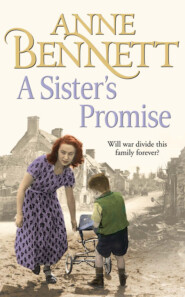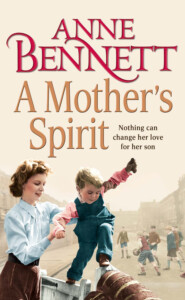По всем вопросам обращайтесь на: info@litportal.ru
(©) 2003-2024.
✖
Pack Up Your Troubles
Автор
Год написания книги
2018
Настройки чтения
Размер шрифта
Высота строк
Поля
When Maeve got them up into the attic, unless it was the depths of winter, she’d often have a bit of a game with them – tickling them into laughter perhaps or telling them a wee story. However, that evening Maeve, having finished washing Grace, then picked her up to take her to bed. Kevin, who’d been washed first and was sitting on a cracket by the fire, got to his feet, having no wish to be left with a man who scared the living daylights out of him. In his panic to follow his mother, he stumbled over the fender, knocking against his father, causing him to tip the hot tea down his leg.
With a roar Brendan was upon the child and Kevin’s resultant shriek stopped Maeve in her tracks. But she knew whatever had happened she could do nothing with Grace in her arms. She ran up to the attic and laid her in the bed, cautioning her to stay there, then flew down the stairs. She knew Grace would stay where she was for she was a timid little thing, and no wonder, and anyway, the screams and shouts from below would frighten the most stout-hearted.
What Maeve saw when she stepped into the room nearly stopped her heart beating, for Brendan had the belt unhooked from his trousers, Kevin’s ragged underpants that he slept in pulled down, and he was whipping his little bottom. Maeve didn’t know what Kevin had done, nor did she care. Whatever it was it didn’t warrant what his father was doing to him and with an outraged scream she was upon him.
Brendan warded her off and then, totally enraged, he turned on her, the belt lashing her to right and left till she sank to the floor with a whimper. ‘Let that be a lesson to you,’ he growled as he pulled his coat from the rail behind the door and slammed his way out.
The next day, Maeve miscarried and she sent Kevin for Elsie. She looked at the stripes on her body where the belt’s end had flicked and asked, ‘Was it you telling him you were pregnant brought this on?’
‘No, not this time,’ Maeve said. ‘This time I got it protecting Kevin. This time the bloody sod didn’t even know I was pregnant.’ The tears came then, hot and scalding as she cried for herself, her children and the little baby she had lost.
Elsie held Maeve tight as she went on, her voice muffled with tears, ‘Kevin spilt his tea, that’s all. An accident, of course – he never goes near the bastard if he can help it – and for that Brendan took his belt off to him.’ She pulled herself out of the comfort of Elsie’s arms, and though the marks of tears were still on her face, her eyes were dry and wide and staring. ‘D’you hear me, Elsie?’ she demanded. ‘That child who’s little more than a baby was whipped with a belt for spilling a drop of tea.’
That was the first time Brendan used his belt on Kevin, but not the last. Maeve fought for him when she could, but she was often stopped by Brendan’s threat: ‘Come nearer or lift a hand to help him and I’ll beat him senseless.’
Maeve knew he was capable of it, for he truly seemed to detest Kevin and she was forced to watch. She thought of seeking advice at the church, but hesitated to involve the priest, Father Trelawney, who seemed anyway a great buddy of Brendan’s. Brendan said it was a father’s duty to chastise his son and Maeve was very much afraid the priest might agree.
Just before Kevin began school, Maeve miscarried again and Kevin indirectly caused that as well. Both children had caught measles, but Grace, who’d not been as ill as Kevin, was up and about while Kevin was still very poorly indeed. He lay across the chairs during the day with the curtains drawn to protect his eyes. Maeve used the rent money to pay the doctor’s bill and buy the medicine and the meat for nourishing broth to spoon into him.
That day Maeve had Brendan’s dinner cooking on the stove when Kevin began to vomit. By the time the nausea had passed and Kevin had lain back exhausted on the pillows and Maeve had wiped his face and given him a drink and taken the bowl to wash, the potatoes had stuck to the pan and the sausages were blackened.
Brendan’s rage was terrible. ‘But,’ Maeve told Elsie later, ‘he knew I was pregnant this time. I don’t know how, Elsie. He seemed to concentrate on my stomach. Anyway he’s got what he wanted, another little baby is lost.’
‘Yes,’ said Elsie grimly. Brendan seemed to be getting worse, both to Maeve and young Kevin, and Elsie was afraid for them all. She’d heard of women been killed by violent husbands and they were never brought to court for it. There was always some other cause registered on the death certificate. She wished that Maeve could get away somewhere, or else that Brendan could be run down by a tram.
In the dark of the night, Maeve, often hungry, tired and worn out trying to placate Brendan, would wonder about her life. And though she loved her children dearly and felt they were the only good thing to come out of her travesty of a marriage, she longed sometimes to be able to turn the clock back. She wished she could return to the cosy farmhouse where no one threatened another. Her father had never raised his hand to her, or any of her sisters. Annie had always said his hands were too hard and he might hurt them too much. Dear God, Maeve thought, if he only saw me now. He’d murder Brendan for laying a hand on me, let alone wee Kevin.
But Maeve didn’t tell them – couldn’t tell them. She wrote about the children and how they were and what they were doing, glad her mother could not see their pinched, impoverished faces, their patched, darned and ragged clothes and often bare feet. She told her of the miscarriages, needing sympathy, for Brendan had given her none. The first time he’d been surprised to find her in bed and Elsie in charge of his tea, for he’d not known of Maeve’s pregnancy, but he’d said little about it except to tell Maeve it was probably all to the good since the two they had were enough to rear.
Maeve had turned her head away, too miserable to say anything. But the second time, she’d turned on him angrily. ‘Are you satisfied now, you bloody brute?’ she’d cried. ‘Are you going to beat any child I’m expecting out of me? Dear God, Brendan, I hope your conscience is clear enough for you to sleep at night.’
She got a slap for her outburst, but it had been worth it to see how shocked he’d been that she’d actually answered him back.
Her mother, though, sent her back encouraging little letters that made her cry. She wrote as she spoke and the hurt she felt on Maeve’s losses was genuine. It was as if she reached across the water to her and Maeve missed her more than ever.
In January 1936, George V died at Sandringham, and it was supposed his eldest son, the popular Edward, would succeed him, though it was rumoured that he was having an affair with a divorcee, Wallis Simpson.
‘Can’t have her as Queen,’ Elsie commented, ‘not a divorcee.’
‘Why?’ Maeve asked. ‘It’s only the Catholic Church that doesn’t recognise divorce.’
‘Aye, but he’s the head of the Church of England, isn’t he, the King?’ Elsie said. ‘No. Can’t have him on the throne and then marry her.’
It seemed Elsie was right, for, as the days passed, there was no news of a coronation. ‘I’d not want the crown at the moment anyroad,’ Elsie said. ‘The world’s a dicey place and I think the whole thing’s going to blow up in our face. I’d not want to be in the government or the Royal Family just now. I mean, look at them Germans again.’
Maeve nodded. Some dreadful tales were coming out of that country, things they’d done to the Jews that it was hard to believe. ‘Warmongers, that’s what Germans are,’ Elsie said. ‘Mark my words there’ll be trouble. Why else are they building up their armies and that?’
Maeve couldn’t answer her. Just a couple of years before, Hitler had been made Führer of Germany and conscription was brought in. Not the action of a peaceful country, surely?
Brendan said it wouldn’t affect them anyway. ‘It’ll probably come to nothing,’ he said. ‘Germany was soundly beaten last time. They’ll hardly come back for more.’
‘What about the things people say they’re doing to the Jews?’
Brendan shrugged. ‘We’re not Jews – what do we care?’ he said indifferently. ‘Things just as bad have been done to Catholics in the past.’
Maeve knew Brendan was right, but she didn’t think that just because atrocities were committed against one group in the past they should be tolerated against another group now. But surely, surely it wouldn’t come to war. The First World War was supposed to be the war to end all wars and over ten million had died to make sure it was. No country could want that carnage again; they wouldn’t be that stupid.
Even when civil war broke out in Spain in July few Britons were bothered. What was Spain anyway? It was nothing to do with them. France and Britain were right to agree to a policy of nonintervention. But when news came that Hitler’s armies and those of Italy under Mussolini were being sent to help Franco, the military dictator, two thousand British people joined the International Brigade on the side of the Republicans and sailed for Spain.
‘Bloody fools,’ Brendan declared. ‘It isn’t their fight.’
‘Maybe they have a conscience,’ Maeve retorted, angry with him because he had given Kevin a sound spanking for dropping a cup and breaking it. ‘That’s something you don’t seem to have.’
Brendan grabbed Maeve’s cheeks and squeezed them between his large muscular fingers. ‘Watch that lip,’ he said, ‘or I just might split it open for you.’
‘Oh Brendan, leave me alone,’ Maeve said wearily, jerking her head away. ‘Leave us all alone, please, can’t you?’
‘Aye, I can,’ Brendan said with a humourless laugh. ‘But maybe I don’t want to.’
And that, thought Maeve, is the truth of it. He enjoys tormenting us.
But the international situation was more unsettling than Brendan’s attitude, for wasn’t she used to that? She listened to it on the new wireless with its accumulator, which Elsie and Alf had bought themselves, and knew that war clouds were gathering all around them.
Kevin began St Catherine’s School the September before his fifth birthday. To Maeve’s shame and distress, he had no shoes and his clothes were darned and ragged, but she couldn’t even scrape up the coppers to buy better second-hand stuff. She was behind again with the rent and knew if some of the arrears weren’t paid off she’d be out in the street.
Kevin wasn’t the only barefoot or badly shod child at the school, and in October a man came to see them from the Birmingham Mail Christmas Tree Fund. Kevin came home a few days later clutching not only a pair of new boots stamped so they couldn’t be pawned, and a pair of socks to go with them, but also a pair of brown corduroy trousers and a navy jumper and shirt. Maeve was glad of the decent warm clothing, but mortified that she was unable to provide them herself, especially when she knew her husband was in full-time work for which he was paid a living wage.
What made it worse were the two hundred men who’d marched from Jarrow in the northeast of England, where unemployment stood at sixty-eight per cent. They were demanding jobs and had marched to London with a petition, but the Prime Minister refused even to see or to speak to them.
Maeve felt she could have accepted her poverty better if Brendan had been unemployed and they’d had to exist on dole money. She’d read somewhere that the average family of husband, wife and two children needed six pounds a week to keep them above the poverty line. She knew many earned much less than that, but she was pretty certain that Brendan earned that much and more, for his job was skilled. But she was lucky if she saw the odd pound of it, and while her husband seemed to have money to do as he pleased, the rest of the family were definitely in poverty.
As the year drew to a close, Edward, the uncrowned King, abdicated. He said he ‘found it impossible . . . to discharge my duties as King . . . without the help and support of the woman I love.’
Everyone was shocked at what he had done. ‘Love, my arse,’ Elsie said angrily. ‘What’s he playing at? He’s the King and that should come first. As my mother would say, love flies out the window when the bills come in the door.’
‘Well, that would hardly apply to them, would it, Elsie?’ Maeve said with a laugh, amazed that her friend should care so much.
But most people had an opinion on the abdication and she found it was discussed everywhere. But however anyone felt, by 12 December 1936 Britain had a new King – Prince Albert, who would be known as George VI. He’d married a lady called Elizabeth Bowes-Lyon, who would be Queen, and he had two daughters. The elder, Elizabeth, who was then ten years old, was now heir to the throne.
Maeve listened to it all on Elsie’s wireless and later read about it in the paper, but all in all she felt nothing in her situation was likely to change, whichever King was on the throne, and she looked forward with little enthusiasm to 1937.
FOUR (#ulink_30e392a5-917d-5d9c-8348-d8ae0861d439)
‘Terrible world to bring kids up in, this,’ Elsie said to Maeve one day in the spring of 1938. She was eyeing Maeve’s swollen stomach as she spoke, because Maeve was six months gone again and when she’d told Brendan about it she’d borne the marks for almost a week. Still, he’d more or less left her alone after that. This was one at least she hadn’t miscarried. And there was nothing to be gained by going on about it. The world was a dangerous enough place with enough to worry about, God alone knew. Elsie often thought it was as if the whole globe was like a tinderbox and ready to go up at any time. ‘I mean, bloody civil war still going on in Spain,’ she said. ‘And that bloody Hitler and Mussolini like bosom buddies and now the Nips attacking the Chinese.’
‘Yes, but none of it affects us,’ Maeve said, ‘not really. I mean, it’s all happening miles away.’
‘Don’t you believe it,’ Elsie countered. ‘If you ask me, girl, we’re teetering on the edge of war.’











